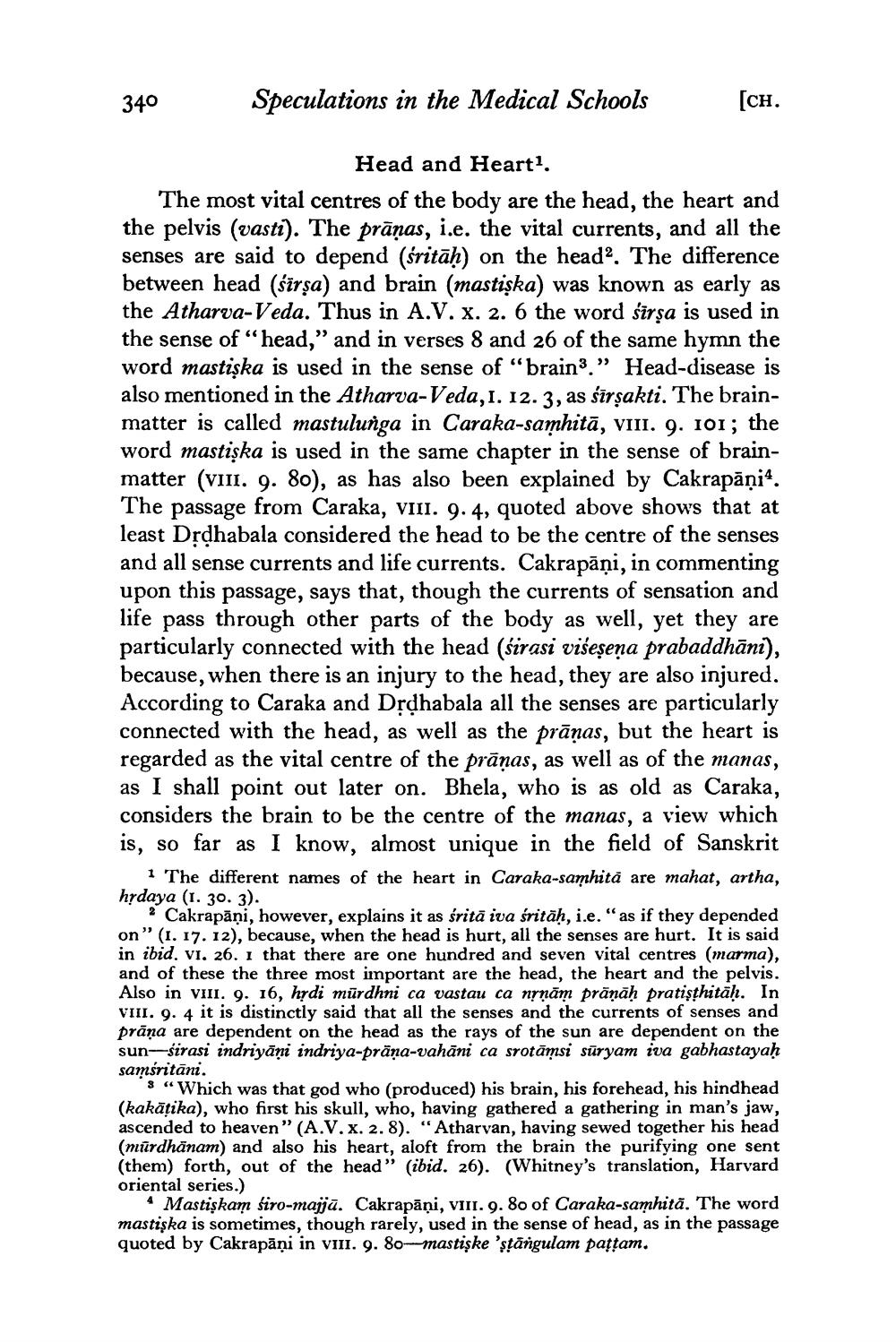________________
340
Speculations in the Medical Schools
[CH.
Head and Heart The most vital centres of the body are the head, the heart and the pelvis (vasti). The prāņas, i.e. the vital currents, and all the senses are said to depend (śritāḥ) on the head?. The difference between head (śīrşa) and brain (mastişka) was known as early as the Atharva-Veda. Thus in A.V. X. 2. 6 the word śīrşa is used in the sense of “head," and in verses 8 and 26 of the same hymn the word mastişka is used in the sense of "brain?” Head-disease is also mentioned in the Atharva-Veda, 1. 12. 3, as sīrşakti. The brainmatter is called mastulunga in Caraka-samhitā, VIII. 9. 101; the word mastişka is used in the same chapter in the sense of brainmatter (VIII. 9. 80), as has also been explained by Cakrapāņi". The passage from Caraka, viii. 9.4, quoted above shows that at least Dşdhabala considered the head to be the centre of the senses and all sense currents and life currents. Cakrapāņi, in commenting upon this passage, says that, though the currents of sensation and life pass through other parts of the body as well, yet they are particularly connected with the head (śirasi višeşeņa prabaddhāni), because, when there is an injury to the head, they are also injured. According to Caraka and Dươhabala all the senses are particularly connected with the head, as well as the prāņas, but the heart is regarded as the vital centre of the prāņas, as well as of the manas, as I shall point out later on. Bhela, who is as old as Caraka, considers the brain to be the centre of the manas, a view which is, so far as I know, almost unique in the field of Sanskrit
1 The different names of the heart in Caraka-samhită are mahat, artha, hrdaya (1. 30. 3).
? Cakrapāņi, however, explains it as sritā iva śritāḥ, i.e. "as if they depended on” (1. 17. 12), because, when the head is hurt, all the senses are hurt. It is said in ibid. vi. 26. I that there are one hundred and seven vital centres (marma). and of these the three most important are the head, the heart and the pelvis. Also in VIII. 9. 16, hrdi mürdhni ca vastau ca nrņām prāņāḥ pratişthitāḥ. In VIII. 9. 4 it is distinctly said that all the senses and the currents of senses and prāņa are dependent on the head as the rays of the sun are dependent on the sun-sirasi indriyāni indriya-prāna-vahāni ca srotāmsi sūryam iva gabhastayah samsritāni.
8 “Which was that god who (produced) his brain, his forehead, his hindhead (kakātika), who first his skull, who, having gathered a gathering in man's jaw, ascended to heaven" (A.V.x. 2.8). "Atharvan, having sewed together his head (mürdhānam) and also his heart, aloft from the brain the purifying one sent (them) forth, out of the head” (ibid. 26). (Whitney's translation, Harvard oriental series.)
- Mastiskam siro-majjā. Cakrapāņi, VIII. 9. 80 of Caraka-samhitā. The word mastiska is sometimes, though rarely, used in the sense of head, as in the passage quoted by Cakrapāni in VIII. 9. 80--mastiske 'stāngulam pattam.




